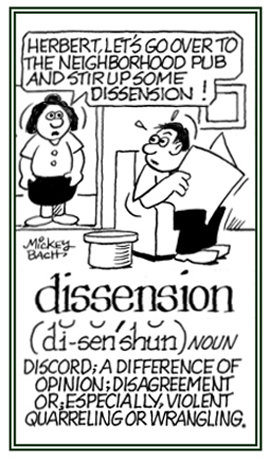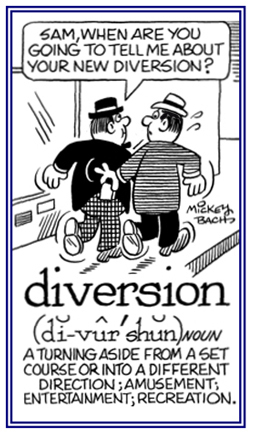-sion, -sions
(Latin: a suffix found at the end of some words that make certain verbs become nouns.)
If you need any information regarding the pronunciation system being used for the words in this unit, click on this Pronunciation Chart for a presentation of simplified American-English pronunciations.
Dissension is said to be the difference between the man who knows it all and the other man who knows it all OR it’s an argumentative debate to which one can contribute either light or heat, but not both.
It is one of the commonest of mistakes to consider that the limit of our power of perception is also the limit of all there is to perceive.

Go to this Word A Day Revisited Index
so you can see more of Mickey Bach's cartoons.
2. A change in the purpose or the use of something from what was intended or from what it was previously: While she was baking in the kitchen, Sarah saw a package of chocolate chips that became a welcome diversion of the kind of cookies she was thinking about baking; which was, chocolate chip instead of peanut butter.
3. A change in the direction or the path of something: The rock slide in the mountains caused a diversion of traffic along the nearby highway.
4. An activity or interest that takes a person's mind off more routine or serious things: Jason joined a golf club as a diversion from the pressures of his work at the bank.
5. An action aimed at distracting the attention of others from the place of an intended destination: When the children were playing hide and seek in the park, Elaine tossed a stone into the bushes to create a noisy diversion while she ran to hide behind a park bench.
6. Etymology: from Middle French diversion, from Late Latin diversionem, diversio and from Latin divertere, "in different directions"; blended with devertere, "to turn aside,"; from dis-, "aside" and de-, "from" + vertere, "to turn".

Go to this Word A Day Revisited Index
so you can see more of Mickey Bach's cartoons.
2. A procedure that is used in mathematics to find out how often a number is in another numerical quantity: First the students learned to multiply numbers, then they were taught the skills of the division of such symbols as, 9 by 3 = 3.
3. A group of people who participate in a specialized profession of a large organization: Karl was a reporter in the news division of the TV station.
4. A special military organization: An army division consists of five brigades.
5. A team of people who are nearly the same age, stature, gender, etc. who compete in sports against each other: The soccer players from one division of the country won the final game in the series by one point over those in the other division.
6. A composition of people in different communities, countries, etc., who do not have the same beliefs or ways of living which separates them from each other: There have been serious divisions between the government and the rebels which have resulted in many deaths and so much destruction that thousands of people have been forced to flee into other countries in order to survive.
The division within the church between those who wanted a professional choir and those who wanted a volunteer choir was causing conflicts that disturbed the other members of the congregation.
2. In medicine, an escape of fluid into a body cavity: The surgeon installed a thin tube into the incision of the abdomen of the patient which would control the effusion, allowing it to drain out of the body and not contribute to possible infections.
3. An instance of unrestrained speech or writing: Although initially very controlled, the convocation speaker eventually spoke with great effusion about the future that lay before the graduate students.
2. An instance of escaping someone or something with deception: The embezzlers, Tim and Jim, celebrated their elusion of the police a little too soon, because they were caught the next day.
2. The appearance of a moon, a planet, or other heavenly bodies after an eclipse: Using a strong telescope, the astronomer was able to chart the emersion of the distant planet after the eclipse of the sun.
2. The outpouring of a liquid from a pipe: When the farmer turned the water main on, there was an emission of water from the concrete conduit as it flowed into the orchard to water the trees.
3. The action of small particles or substances moving away from a central source: The emission of heat from the fireplace soon warmed the entire room.
4. One of a number of ways in which something may be discharged out of the body: Coughing is a way to facilitate the emission of phlegm from the throat.
5. Something that has been discharged or released from the body: Dr. Smith sent a sample of the emission of pus from the patient's wound to the laboratory to be analyzed.
Cream is a yellowish oil in an emulsion of milk which separates when they are allowed to stay in a container for a period of time.
An emulsion of very small grains of silver bromide and gelatin are used to make the surface of photographic film sensitive to light.
When Sara leaned forward to kiss Jerome goodbye, after breaking up with him to be with another person, he made an evasion by pretending to sneeze.
2. The outwardly twisting of one's foot or feet: Because of the injury of his ankle which caused a painful eversion, Charles had to buy special shoes that would fit and not cause him any further suffering.
2. A surgical act or procedure to remove something that may cause illness or harm in a patient: The careful excision by the surgeon removed the tumor from the football player's knee and he was assured that the wound would heal and he would be able to play again soon.
3. Excommunication or banishment from a church congregation or refusing an individual the right to participate in the religious activities of a specific church: When a young man was arrested for a series of robberies and the pastor was informed of his multiple misdeeds, there was an excision of the person's name from membership.
2. A result of going off with a loud noise under the influence of suddenly developed internal energy; also used in reference to electric discharges or to a boiler, bomb, gun, etc.: The explosion of the gun shot in the corridor of the school frightened the children and caused the principal to immediately contact the police.
3. The action of suddenly bursting or flying in pieces from a primary cause: There was nothing but debris, or wreckage, on the ground after the midair explosion that destroyed the small aircraft as it was taking off; unfortunately, the pilot did not survive.
4. A sudden increase in size or number; such as, a population: With the successful drilling of water wells in the desert community, there was an explosion of people who moved there from a nearby overly crowded city.
Usually when someone grins or smiles, he or she is making an expression of happiness, pleasure, or satisfaction.
2. A presentation of one's feelings or opinions: In a democracy, everyone should have the freedom of expression regarding his or her views about the government.The convicted criminal showed an expression of disappointment as the judge sentenced him to life in prison.


